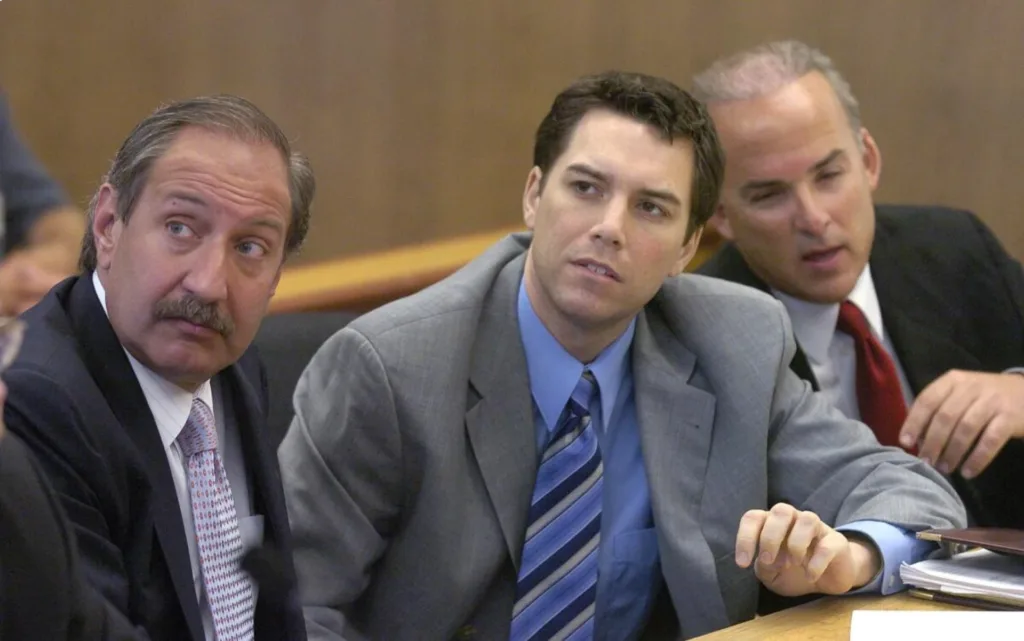
Theres a Lot of Projection in the Scott Peterson Case
Table of Contents
Explore how media influence and theres a lot of projection in the scott Peterson case, impacting justice, public opinion, and societal fears. Scott Peterson is one of the most well-known ‘criminals’ in modern American history. The brutal killings of Mrs. Laci Peterson, a young pregnant lady with so much ahead of her and her unborn son Conner sent the country on searching for some explanation. Scott Peterson, her husband, was convicted as the killer but people have not lost interest in the case, courtesy of media, theories and over-imagining. In this article, I will discuss how the psychological projection process and media played their part in forming a distorted perception out in the public it became very hard for many people to differentiate between actual facts and bias.

Understanding Psychological Projection and Its Role in Crime Perception
Generally, psychological projection is one of the defense mechanisms where instead of dealing with psychological conflicts in one’s self, one attributes such a conflict in someone else. In many high-stake situations such as in the case of Scott Peterson, projection becomes very effective cause people project in them their own fears, suspicion or ethical beliefs.
When people learn of a violent crime like the Peterson murders, natural emotions arise: fear, anger, sadness and anxiety. In order to regulate these emotions the public may projektivly place all the bad qualities into the accused ‘he is a villain, he is a traitor, he is violent, he is a deceiver”. This is how a Real person — Peterson — transforms into a personification of Everything that is frightening about treason and violence within intimate partnerships.
The Background: The Life and Marriage of Scott and Laci Peterson
Scott and Laci Peterson succeeded in giving an image of a successful marriage. They both got married in 1997 and after five years of marriage they were looking forward to the arrival of their first child, Conner, this was never to be though since Laci went missing on Christmas Eve of 2002. Was found dead months later on the San Francisco Bay shoreline, and her unborn child with her. When that happened, the entire country went hog wild and scrutinized every aspect of their lives.
But the phase of revealing more details made it even more sensationalizing, especially when Scott’s affair with Amber Frey was aired. People were grieving, furious, and desperate, and that passion fueled the brittle, explosive quality of media coverage, along with Peterson’s calm and unapologetic (if entirely non-British) presence in the spotlight, and his commodification of his infidelity. This story was primed to set the country aflame, and psychological projection became established; it was not just Scott the man accused of the crime the country consumed but projected further into someone who BETRAYEDidelity, deception, and betrayal.
The Role of Media in Shaping the Scott Peterson Narrative
It was the media that actively helped to transform Scott Peterson into the embodiment of guilt. Moderate to sensationalist presentation concentrated on aspects such as his conduct, private life and apparent absence of some sort of emotional howling, which is taken as evidence of culpability. This coverage fostered people’s feelings and made Peterson the villain of this sad narrative.
- Sensationalism and Bias: Instead of uncovering clear facts and evidence, Hear’ the Sustained Republican featured headlines and soundbites that dealt with Scott’s behavior and his interaction with Frey and thus shaped people’s opinion . Instead of presenting facts contained in the investigation of Peterson, the media outlets broadcast material that focused on Peterson’s lack of empathy and untrustworthiness.
- Public Accessibility to Information: It would be the first case that happened after the adoption of a new media coverage model characterized by constant updates on the beginning of new developments. Every aspect down to hearsay was discussed in real time meaning that the participants did not have a chance to consider much privacy or even especially objectivity.
By devoting a lot of attention to the incident when reporting it, the media unconsciously prompted observers to make hasty decisions based on feelings. And thus, Peterson turned into a canvas for people’s concerns and resentments, and he was presumed guilty from the beginning.
The Effects of Psychological Projection on Public Opinion
For the audience, Scott Peterson was a living embodiment of the type of betrayal and closeness most people detested. The audiences let their fears regarding relationships, trust and violence on him thus feeling close and caring for the verdict. This phenomenon was that Peterson was assessed not by any concrete proof but by the loyalties the commons dragged into the equation.
Projection influenced perceptions in several ways:
- Seeing What We Fear: Everyone had observed that, for Peterson, there was no grieving a wife’s death; his demeanor was barely that–people felt it as cold-bloodedness, and their vision was a function of their preconceptions about how a man who lost his wife should behave.
- Moral Condemnation: This point was brought by the fact that people thought Peterson committed a wrong doing by having an affair with Arian’s wife hence, infidelity is equal to moral and criminal wrongdoing.
- Desire for Justice: Justice for Laci and Conner, that is what everyone sought for, Scott became the scapegoat for that entitlement, people somehow could not substantial in their feelings, but simply assumed him guilty by feelings alone.
A look at Peterson’s high stakes case demonstrates that projection determines how some details are viewed, even those occurring in real life. This passion interferes with justice, for the public can provide pressure to the legal process.
The Jury’s Dilemma: Managing Public Sentiment and Personal Bias
I found that high profile cases pose special considerations for juror’s and they are expected to be unbiased and unaffected by public pressure. In the Peterson like any other case, the jurors equally received much pressure to conform to the so-called public opinion concocted by the media. The goal of the jury was to select people who would be able to consider all sides of a case but due to projection and constant coverage of such events it proved impossible.
The Weight of Public Expectation
As can be seen for jurors in a trial as popular and sensitive as the Scott Peterson case, it may be overwhelming. Understanding the emotions that the public has placed on the case and the possible reactions that may follow going into court puts pressure on the deciding power to make a decision that will be expected by society. It might cause jurors to absorb the public’s hunger for justice, ensnaring themselves in it, thus making biased decisions.
Social Media’s Hypothetical Role: How Would the Peterson Case Unfold Today?
In the Peterson case which happened prior to the heightened use of social media, we can only imagine how Twitter, facebook among other sites would have fueled the projection phenomenon. When it comes to social media people would follow and react to each detail in real time, thus having a loop.
The Impact of Echo Chambers
This may cause a generation of echo chambers on most of the social media platforms where users will only be in touch with opinions of like minds. In a case like Peterson’s:
- Echo Chambers Reinforce Biases: Another mechanism which probably only reinforces certainty and decreases empathy are people start following users with similar opinions as their own.
- Widespread Misinformation: This is because speculation and rumors cause outcomes that tend to favour an even, balanced narrative of events.
The Peterson case would have introduced another layer of hostility into the objective and exa ggerated projections of the man’s personality through the well-connected coverage of social media.
Post-Conviction Reactions: Ongoing Projections and Appeals
Largely, emotions continued being divided after Scott Peterson was convicted of the murder. Some people were absolutely certain that justice has been rendered, while others doubted whether he was guilty. Calls for retrial continue to cause further polarisation among the people which brings new projections from each side. Some imposed their concern about the imperfection of the justice system, they moreso called for a retrial, while others imposed their anger any retrial would compromise justice.
The Psychological Weight of Public Condemnation
From such a public and social ordeal, even when serving out the sentence, Scott Peterson has most probably experienced a great deal of stress to his psyche. It is beyond the scope of this paper to decide if was guilty or innocent, but it is widely known that the judgment of the public overwhelms him and therefore affect his psychological well-being no matter the outcome of other appeals.
Lessons from the Scott Peterson Case: A Call for Objective Justice
Scott Peterson’s case makes people recall the significance of considering emotional appeal part and parcel of reasonableness in the law. It shows how easily the public can be swayed based on the media and how people can…well, project their own moralities and then stop at nothing to change the course of actions of others it affects and reality unfortunately. In order to achieve a healthy approach to justice all the time, other than acknowledging the presence of psychological projection, other responsible media coverage should be encouraged.
Moving Forward: Strategies for Better Handling High-Profile Cases
- Objective Media Reporting: The media should ensure they give the correct information and not make crime stories as large as they really are not.
- Support for Jurors: Only in very important and well publicized cases do jurors need special assistance in controlling what the public is telling them as well as the evidence.
- Education on Projection and Bias: The public should be made aware about how self-bias and self-projection mechanism contributes towards perception of guilt and this will go a long way in changing the perception towards medias narratives.
Conclusion of Theres a Lot of Projection in the Scott Peterson Case
The case of Scott Peterson has been a wake-up call for society as well as to the operations of the crime justice system concerning psychological projection, the media, and other social effects. What occurred was that these people placed their biases, their beliefs in morality and their anxieties onto Peterson and in doing so, he was not just an accused man — he was something more. Despite the fact that the justice system tries to remain impartial, situations like Peterson’s case prove that external factors and social media can play a role of impact and remain in people’s memory.
Thanks to the analysis of the processes of psychological projection and the analysis of the role of the media we obtain an understanding of how justice can be treated more fairly, more realistically, with less emphasis on the feeling senses and more attention being paid to factual evidence and how the legal process can be preserved from being skewed by sensationalism.
FAQs
1. What role did psychological projection play in the Scott Peterson case?
Projection led people to view Peterson as a representation of betrayal and violence, clouding objective judgment and shaping public perception of his guilt.
2. How did media coverage impact the case?
Sensationalist reporting focused on Peterson’s demeanor and affair, leading the public to see him as guilty before the trial, based on moral outrage rather than evidence.
3. How might social media have affected the case today?
Social media would likely amplify public opinion, with echo chambers reinforcing biases and misinformation spreading quickly.
4. What are the challenges for jurors in high-profile cases?
Jurors face pressure to conform to public sentiment, which can make it difficult to remain impartial, especially in cases with intense media coverage.
5. How can future cases be handled better?
Balanced media reporting, education on projection, and support for jurors can help maintain objectivity and ensure a fair trial, even in high-profile cases.













Add comment